The Pymetrics Games – Overview and Practice Guidelines
The Pymetrics Games are one of the fastest-growing screening tools in the pre-employment testing industry. These AI-based games are now used by some of the most lucrative employers in the world, including JP Morgan, BCG, Morgan Stanley, AstraZeneca, and more.
In the following guide we provide you with a brief overview on how these 12 games work, what they measure, and how you can (contrary to the common misconception) prepare for them and pass.
What Are Pymetrics Games?
The Pymetrics Games are 12 online games used as an assessment tool for major employers worldwide. Using sophisticated AI algorithms which analyse the player’s behaviour, these 12 games measure over 90 cognitive, social, and behavioural traits.
What Do Pymetrics Games Measure?
The Pymetrics test is used to measure 91 traits. These fit into 9 different categories:
- Attention
- Decision Making
- Effort
- Emotion
- Fairness
- Focus
- Generosity
- Learning
- Risk Tolerance
While traditional personality profiling tests measuring these traits are based on self-report, Pymetrics games monitor your behaviour during the test, making it impossible to “trick the system”. However, this doesn’t mean that you can’t prepare and improve your performance.
Should You (and Can You) Prepare for Pymetrics Assessment?
There is a common misconception you cannot (and therefore should not) prepare for the Pymetrics test. This is, however, simply not true.
It is true that it is harder to prepare for Pymetrics tests than other, more standard assessments, but it is definitely possible. With accurate practice methods, as offered on JobTestPrep’s Pymetrics Test Preparation, you can improve your game behaviour and overall score.
All 12 Pymetrics Games – a Brief Overview
#1 – Balloon Game
You are requested to pump balloons, where each pump earns you money. You may deposit your earned sum at any point, but the balloons are always at risk of exploding.

Assesses: risk taking and decision-making.
#2 – Tower Game
A version of the famous Hanoi Towers game, this test requires you to rearrange three towers with the least moves.
Assesses: planning ability.
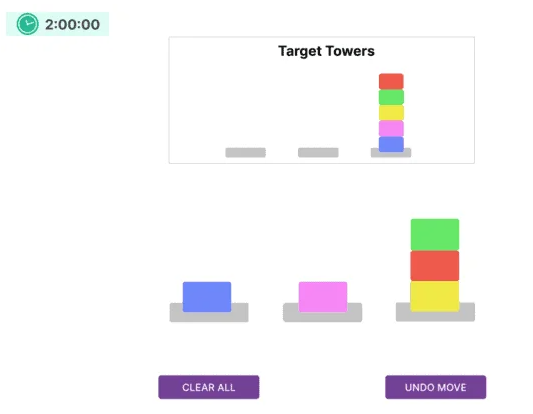
#3 – Money Exchange Game #1
Each round of this game follows a structured pattern of transactions between you and another AI-based player. You are also asked to rate the fairness of the transactions.
Assesses: risk taking and trust.
#4 – Money Exchange Game #2
This game is a variation of Money Exchange Game #1, merely with different rules.
Assesses: altruism.
#5 – Keypress Game
In this very simple game, you are requested to hit a specific key on your keyboard as fast as you can, until instructed to stop. The game will constantly alternate between ‘start’ and ‘stop’.
Assesses: following instructions and impulsivity.
#6 – Hard or Easy Task Game
In each round you are required to perform one of two optional tasks:
- An easy task (higher success probability) with a low prize
- A hard task (lower success probability) with a higher prize
These are not actual tasks, of course, and your only actual task is to pick one.
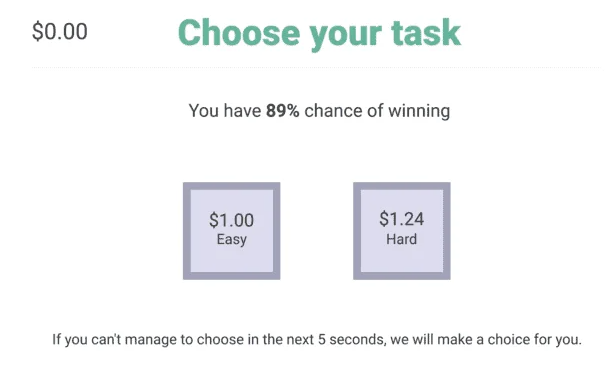
Assesses: effort, decision making, and motivation
#7 – Digits Memory Game
This is a basic memory game, challenging you to memorize a sequence of given digits quickly flashing on your screen.

Assesses: memory
#8 – Stop Game
This game presents you a random sequence of shapes in two different colours. You need to hit the space key when a given colour appears.
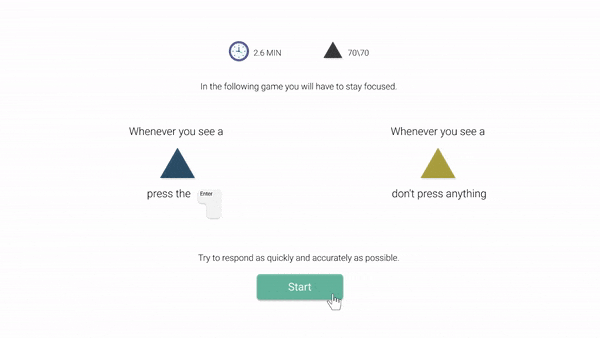
Assesses: attention
#9 – Arrows Game
In this game, you are asked to determine the directions of two sets of flashing arrows. Different rules apply to different colours.

Assesses: adaptivity and learning
#10 - Lengths Game
You are shown one of two very similar images. Yet, a specific element in the image may be slightly longer or shorter. Pay close attention and recognise which image is presented.
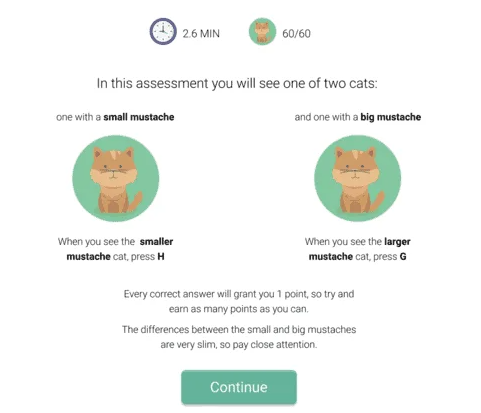
Assesses: attention to detail, motivation
#11 – Cards Game
You draw a card out of four possible decks. Each card may earn or lose you money. Your task is to win the largest amount possible. While the patterns seem random initially, with careful attention you will learn to recognise them.

#12 – Faces Game
This unique game will present you with multiple facial expressions, sometimes accompanied by a brief description. You are requested to recognise the emotion conveyed in the person’s face.
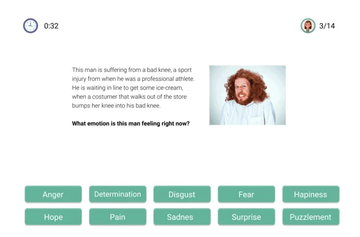
Assesses: emotional intelligence
Preparing and Passing the Pymetrics Test
Although it is genuinely difficult to practise for the Pymetrics games with standard drills and prep materials, there are two major keys for an effective practice plan that will actually increase your chances of success.
- Understand the measured traits of each game and the behaviour you are expected to demonstrate.
- The best possible options – play the games! JobTestPrep’s Pymetrics Preparation Pack contains accurate simulations of the Pymetrics games and teaches you the backstage success secrets.
This article was written by Shlomik Silbiger, JobTestPrep’s expert on Pymetrics Games.
Feel free to contact Shlomik at ask_shlomik@jobtestprep.com.
Free access to JobTestPrep for Oxford University students
As an Oxford University student, you can get free access to JobTestPrep via the Careers Service to practise for a wide variety of online recruitment tests, including Pymetrics, Online Immersive Assessments in the finance industry, e-tray exercises and assessment centres as well as numerical-, verbal- and spatial-reasoning tests. Find out how you can gain access >>




